
"Get Back" is a song recorded by the English rock band the Beatles and Billy Preston, written by Paul McCartney, and credited to the Lennon–McCartney partnership. It was originally released as a single on 11 April 1969 and credited to "The Beatles with Billy Preston". The song is one of the few examples of John Lennon featuring prominently as lead guitarist. The album version of this song contains a different mix that features a studio chat between Paul McCartney and John Lennon at the beginning, which lasts for 20 seconds before the song begins, also omitting the coda featured in the single version, and with a final dialogue taken from the Beatles' rooftop concert. This version became the closing track of Let It Be (1970), which was released just after the group split up. The single version was later issued on the compilation albums 1967–1970, 20 Greatest Hits, Past Masters, and 1.

"With a Little Help from My Friends" is a song by the English rock band the Beatles, from their 1967 album Sgt. Pepper's Lonely Hearts Club Band. It was written primarily by Paul McCartney with contributions from John Lennon and sung by drummer Ringo Starr, his lead vocal for the album. As the second track on the album, it segues from the applause on the title track.
Stars on 45 was a Dutch novelty pop act that was successful in Europe, the United States, and Australia in the early 1980s. The group later shortened its name to Stars On in the U.S., while in the United Kingdom and Ireland it was known as Starsound. The band, which consisted solely of studio session musicians under the direction of Jaap Eggermont, formerly of Golden Earring, recorded medley recordings made by recreating hit songs as faithfully as possible and joining them together with a common tempo and underlying drum track.

"Let It Be" is a song by the English rock band the Beatles, released on 6 March 1970 as a single, and as the title track of their album Let It Be. It was written and sung by Paul McCartney, and credited to the Lennon–McCartney partnership. The single version of the song, produced by George Martin, features a softer guitar solo and the orchestral section mixed low, compared with the album version, produced by Phil Spector, featuring a more aggressive guitar solo and the orchestral sections mixed higher.

Abbey Road is the eleventh studio album by the English rock band the Beatles, released on 26 September 1969. It is the last album the group recorded, although Let It Be was the last album completed before the band's break-up in April 1970. It was mostly recorded in April, July, and August 1969, and topped the record charts in both the United States and the United Kingdom. A double A-side single from the album, "Something" / "Come Together", was released in October, which also topped the charts in the US.

"Come Together" is a song by the English rock band the Beatles, written by John Lennon and credited to Lennon–McCartney. The song is the opening track on their 1969 album Abbey Road and was also released as a single coupled with "Something". The song reached the top of the charts in the United States and Australia, but peaked at No. 4 in the United Kingdom.

"Birthday" is a song by the English rock band the Beatles from their 1968 double album The Beatles. Written by John Lennon and Paul McCartney, mainly by McCartney, it is the opening track on the third side of the LP. Surviving Beatles Paul McCartney and Ringo Starr performed it for Starr's 70th birthday at Radio City Music Hall on 7 July 2010.

"Help!" is a song by the English rock band the Beatles that served as the title song for the 1965 film and the band's accompanying soundtrack album. It was released as a single in July 1965, and was number one for three weeks in the United States and the United Kingdom.

"Do You Want to Know a Secret" is a song by English rock band the Beatles from their 1963 album Please Please Me, sung by George Harrison. In the United States, it was the first top ten song to feature Harrison as a lead singer, reaching No. 2 on the Billboard chart in 1964 as a single released by Vee-Jay, VJ 587. In the UK, Billy J. Kramer released a cover of the song as his debut single, reaching No. 1 on the NME singles chart and No. 2 on the Record Retailer chart.
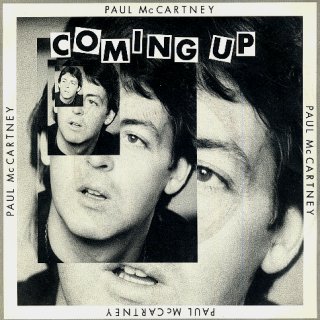
"Coming Up" is a song written and performed by the English rock musician Paul McCartney, released as the opening track on his second solo studio album McCartney II (1980). Like other songs on the album, the song has a synthesised sound, featuring sped-up vocals created by using a vari-speed tape machine. McCartney played all instruments.

Long Play Album is the first album by the Dutch soundalike studio group Stars on 45, released on the CNR Records label in the Netherlands in 1981. In the US, the album was retitled Stars on Long Play, released on Atlantic Records' sublabel Radio Records and credited to 'Stars On'. In the UK, Ireland, Australia and New Zealand the group was renamed 'Starsound' and the album itself was listed as Stars on 45 or Stars on 45 - The Album and released by CBS Records. In Spanish-speaking countries, both the group and the album were launched under a fourth name: Estrellas en 45. Stars on 45 was also one of the very few Western pop albums to be officially released in the Soviet Union and large parts of the Eastern Bloc on the state-owned Melodiya label, credited to Stars on 45 but the Russian title of the album translates as Discothèque Stars and in Czechoslovakia on the state-owned Opus label as "Stars on 45". In the Philippines, it was released under the title Stars on 45 Long Play Album.
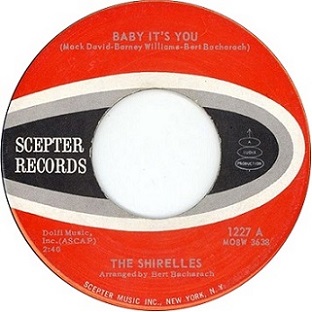
"Baby It's You" is a song written by Burt Bacharach (music), Luther Dixon, and Mack David (lyrics). It was recorded by the Shirelles and the Beatles and was a hit for both. The highest-charting version of "Baby It's You" was by the band Smith, who took the track to No.5 on the US charts in 1969.
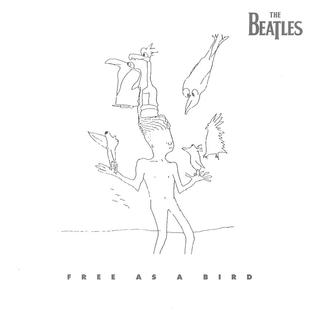
"Free as a Bird" is a single released in December 1995 by English rock band the Beatles. The song was originally written and recorded in 1977 as a home demo by John Lennon. In 1995, 25 years after their break-up and 15 years after Lennon's murder, his then surviving bandmates Paul McCartney, George Harrison and Ringo Starr released a studio version incorporating the demo.
"Come Go With Me" is a song written by C. E. Quick, an original member of the American doo-wop vocal group the Del-Vikings. The song was originally recorded by The Del-Vikings in 1956 but not released until July 1957 on the Luniverse LP Come Go With The Del Vikings. The final version was released in the second week of January 1957 and was led by Gus Backus. When Joe Averbach, the owner of Fee Bee Records couldn't handle the demand, he signed with Dot Records in late January 1957; the song became a hit, peaking at No. 5 on the US Billboard Top 100 Pop Charts. It also reached No. 2 on the R&B chart.

Longplay Album – Volume II is the second album by the Dutch soundalike studio group Stars on 45, released on the CNR Records label in the Netherlands in August 1981. In the US the album was retitled Stars On Long Play II, released on Radio Records and credited to 'Stars On'. In the UK, Ireland, Australia and New Zealand the album was listed as Stars on 45 Volume 2 or Stars on 45 - The Album - Volume 2, credited to Starsound and issued on CBS Records. Just like the first Stars on 45 album Longplay Album – Volume II was also officially released in the Eastern Bloc by state-owned czechoslovak label Opus, credited to Stars On 45 but under the title Stars on 45 - Volume II.
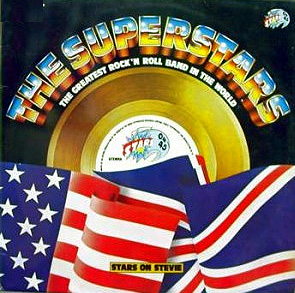
The Superstars is the third album by the Dutch soundalike studio group Stars on 45, released on the CNR Records label in the Netherlands in March 1982. In the US, the album was retitled Stars On Long Play III, released on Radio Records and credited to 'Stars On'. In the UK, Ireland, Australia and New Zealand, the album was instead titled Stars Medley, again credited to Starsound and released by CBS Records. Just like the first Stars on 45 album The Superstars was also issued in the Soviet Union and large parts of the Eastern Bloc by the state-owned label Melodiya, credited to Stars on 45 but released under the title Discotheque Stars 2.

"More Stars" a.k.a. "Stars on 45 Vol. 2" is a song issued in 1981 by the Dutch studio group Stars on 45, in the UK credited to 'Starsound'. It was the follow-up to the US and Dutch #1 and UK #2 single "Stars on 45". "More Stars" was later included on the band's second album Longplay Album - Volume II.
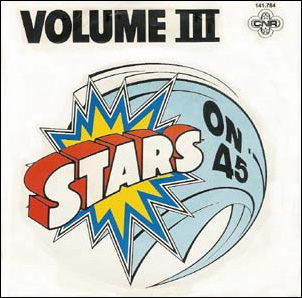
"Volume III" a.k.a. "Stars on 45 Volume 3" is a song issued in 1981 by the Dutch studio group Stars on 45, in the UK credited to 'Starsound'. It was the second single from the band's second full-length release Longplay Album - Volume II.
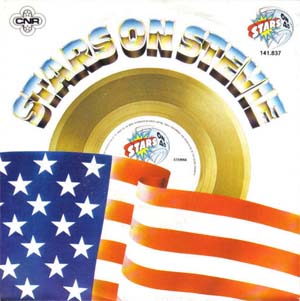
"Stars on Stevie" a.k.a. "Stars Medley" a.k.a. "Stars on 45 III: A Tribute to Stevie Wonder" is a song issued in 1982 by the Dutch studio group Stars on 45, in the UK credited to 'Starsound', in the US 'Stars On'. It was the first single from the band's third full-length release The Superstars and was Stars on 45's fourth single release in both Europe and North America.
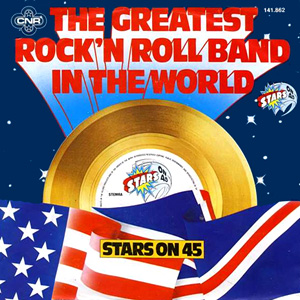
"The Greatest Rock 'n Roll Band in the World" a.k.a. "Stars Medley" a.k.a. "Stars on 45 III: Rollin' Stars" is a song issued in 1982 by the Dutch studio group Stars on 45, in the UK credited to 'Starsound', in the US 'Stars On'. It was the second single from the band's third full-length release The Superstars.

















